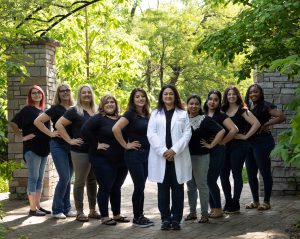Do You Have Obstructive Sleep Apnea? A Sleep Study Can Help
Sleep apneais a common sleep disorder that affects millions of people worldwide and is a significant focus within the field of sleep medicine. It can have a significant impact on an individual’s quality of life and overall health. If you’re experiencing sleep apnea symptoms, seek treatment with a sleep studyat Downtown Dental & Implants of Oswego.
Schedule your appointment today by calling ourOswego, IL dentistat (630) 554-1855. We also proudly serve patients in Aurora, Montgomery, Plainfield, IL, and the surrounding areas.
What Is a Sleep Study?
A sleep studyis a non-invasive procedure that helps medical professionals evaluate and diagnose sleep disorders. It provides comprehensive information about your sleep patterns, breathing, brain activity, and body movements at night. By monitoring these factors, doctors can gain valuable insights into the quality and quantity of your sleep and identify any underlying issues that may be affecting your overall health. Sleep studies are a cornerstone of clinical sleep medicine, providing essential data for the diagnosis and management of various sleep disorders.
What Is Sleep Apnea?
Sleep apneais a sleep disorder characterized by brief interruptions in breathing during sleep. These interruptions, called apneas, can occur multiple times per hour, leading to disrupted sleep patterns and various health issues. Sleep apnea is a type of sleep disordered breathing, which encompasses various conditions that cause abnormal breathing patterns during sleep.
The two primary types of sleep apnea are:
- Obstructive Sleep Apnea (OSA): This is the most common form of sleep apnea and occurs when the muscles at the back of the throat relax excessively, leading to a temporary blockage of the upper airway.
- Central Sleep Apnea (CSA): Less common, CSA occurs when the brain fails to send the proper signals to the muscles that control breathing.
Types of Sleep Studies
- Diagnostic Sleep Study (Polysomnography): This is the most common type of sleep study used to diagnose sleep disorders. It monitors various physiological parameters, including brain activity, eye movements, muscle activity, heart rate, respiratory effort, airflow, and oxygen levels.
- Split-Night Sleep Study: In cases where severe sleep disorders are suspected, a split-night sleep study may be conducted. During the first half of the night, diagnostic monitoring is performed, and if a sleep disorder is confirmed, treatment options such as Continuous Positive Airway Pressure (CPAP) therapy may be initiated during the second half of the night.
- Home Sleep Study: Home sleep apnea testing, also known as portable monitoring, is a less comprehensive but more convenient option for diagnosing specific sleep disorders like sleep apnea. Home sleep apnea tests typically monitor fewer parameters and are suitable for certain cases where full polysomnography is not necessary. These home sleep apnea tests can be an effective diagnostic tool for obstructive sleep apnea, although they have limitations and may require follow-up testing.
Call ourdentist in Oswego, IL, at (630) 554-1855and we’ll go over your sleep study options.
Preparing for a Sleep Study
Preparing for a sleep study is crucial to ensure accurate results and a comfortable experience. Here are some pre-sleep study instructions to follow:
Pre-Sleep Study Instructions
- Avoid caffeine and nicotine: Refrain from consuming caffeine and nicotine for at least 4-6 hours before the sleep study. These substances can interfere with your normal sleep patterns and affect the study’s accuracy.
- Avoid napping: Try to avoid napping during the day before the sleep study to ensure you are sufficiently tired and ready to fall asleep during the overnight test.
- Shower and groom: Shower and groom as you normally would before bedtime. Clean skin helps the sensors adhere properly, ensuring accurate data collection.
- Wear comfortable clothing: Opt for comfortable, loose-fitting clothing to bed. This will help you relax and sleep more naturally during the study.
- Bring necessary items: Pack any necessary items, such as a change of clothes, toiletries, and a book or magazine to read before bed. Familiar items can help you feel more at ease in the sleep center.
- Inform the sleep lab: If you have sensitive skin or adhesive allergies, inform the sleep lab in advance. They can use hypoallergenic sensors to ensure your comfort.
The Sleep Study Process
When it comes to undergoing a sleep study, you’ll go through the following steps:
- Consultation and Preparation:Your journey begins with a consultation with Dr. Shalini Mohan in Oswego, IL. During this initial visit, you’ll discuss your sleep concerns, medical history, and any symptoms you’ve been experiencing. We’ll explain the sleep study process, address any questions or concerns you may have, and refer you to a sleep specialist.
- Study Setup: When you arrive at the sleep clinic, a sleep technologist will guide you through the study setup. Electrodes will be gently attached to various parts of your body, including your scalp, temples, chest, and legs, to monitor brain waves, eye movements, muscle activity, and heart rhythm. Sensors will be placed near your nose and mouth to track breathing patterns, and a pulse oximeter will be clipped to your finger to measure blood oxygen levels.
- Bedtime Routine:Once the sensors and electrodes are in place, it’s time for bed. The sleep technologist will ensure you’re comfortable and that the equipment is functioning correctly. You’ll be able to sleep in a private room designed to promote a relaxed environment that closely resembles your bedroom at home.
- Data Collection:Throughout the night, the sleep technologist will carefully monitor and record various data points, including brain activity, eye movements, heart rate, breathing patterns, and limb movements. The data collected will provide valuable insights into your sleep architecture and help identify any disruptions or abnormalities.
- Morning Evaluation:After a night of monitoring, the sleep technologist will remove the sensors and electrodes. You’ll have the opportunity to freshen up before a post-study evaluation. They’ll thoroughly analyze the data collected during your sleep study to interpret the results accurately.
- Diagnosis and Treatment: If you get diagnosed with sleep apnea, you’ll return to our dental practice. Our Oswego, IL, dentist will go over your treatment options and help you decide on the best one for your needs.
What to Expect During the Study
During the sleep study, you can expect the following:
- Sensor attachment: Sensors will be attached to your body using adhesive or tape. These sensors monitor your brain activity, muscle activity, eye movement, heart rate, and breathing patterns throughout the night.
- Calibration: Before you fall asleep, you will be asked to perform simple tasks to help calibrate the sensors. This may include moving your eyes, opening and closing your mouth, and moving your legs.
- Sleeping: You will be encouraged to sleep as you normally would. The sensors will continuously monitor your sleep patterns, providing valuable data for diagnosing any sleep disorders.
- Staff assistance: Sleep lab staff will be available to assist you if you need to get out of bed or have any questions or concerns during the study. They are there to ensure your comfort and the accuracy of the study.
Common Sleep Disorders Diagnosed With Sleep Studies
Several sleep disorders can be diagnosed with sleep studies, including:
- Sleep Apnea: Characterized by repeated pauses in breathing during sleep, sleep apnea is a common sleep disorder.
- Insomnia: Sleep tests can help identify the underlying causes of insomnia, such as restless leg syndrome or other sleep-related movement disorders.
- Narcolepsy: A sleep test can confirm narcolepsy, a disorder characterized by excessive daytime sleepiness and sudden muscle weakness or paralysis (cataplexy).
- Parasomnias: These include sleepwalking, night terrors, and REM sleep behavior disorder, which can be diagnosed and monitored through a sleep study.
- Periodic Limb Movement Disorder: Characterized by repetitive limb movements during sleep, which can cause sleep disruption and daytime fatigue.
- Restless Legs Syndrome: A condition marked by an uncontrollable urge to move the legs, often accompanied by uncomfortable sensations, which can significantly impact sleep quality.
Diagnosing Sleep Disorders
Diagnosing sleep disorders requires a comprehensive approach, including a thorough medical history, physical examination, and sleep study results. Sleep studies are instrumental in identifying various sleep disorders, providing detailed insights into your sleep patterns and any disruptions.
Diagnosing Obstructive Sleep Apnea
Obstructive sleep apnea (OSA) is a common sleep disorder characterized by repeated episodes of partial or complete upper airway obstruction during sleep. To diagnose OSA, a sleep study is typically performed to monitor breathing patterns, oxygen levels, and sleep stages. The results of the sleep study are then evaluated to determine the severity of OSA, which can range from mild to severe.
- Mild OSA: Characterized by 5-14 episodes of apnea or hypopnea per hour of sleep. Individuals with mild OSA may experience occasional disruptions in their sleep but can often manage symptoms with lifestyle changes.
- Moderate OSA: Characterized by 15-29 episodes of apnea or hypopnea per hour of sleep. Moderate OSA can significantly impact sleep quality and may require medical intervention.
- Severe OSA: Characterized by 30 or more episodes of apnea or hypopnea per hour of sleep. Severe OSA poses serious health risks and typically requires more intensive treatment.
Treatment options for OSA include continuous positive airway pressure (CPAP) therapy, which uses a machine to keep the airway open during sleep, oral appliances that reposition the jaw to maintain an open airway, and lifestyle modifications such as weight loss and exercise. Addressing OSA is crucial for improving sleep quality and overall health.
By following these guidelines and understanding the diagnostic process, you can take proactive steps towards better sleep health. If you suspect you have a sleep disorder, don’t hesitate to seek professional help and undergo a sleep study. Your journey to restful nights and improved quality of life begins with a thorough diagnosis and effective treatment plan.
Frequently Asked Questions
How many hours of sleep are needed for a sleep study?
The duration of a sleep study can vary depending on the specific type of study being conducted and the information needed by the sleep specialist. Generally, a full-night sleep study at a sleep lab is recommended for most individuals to monitor a complete sleep cycle. This typically involves recording sleep data for approximately 7 to 8 hours, which is the average duration of a full night’s sleep for adults.
Can I take my regular medications before a sleep study?
Discuss your medications with your doctor before the sleep study. Some medications can influence sleep patterns and may need to be adjusted or temporarily discontinued before the study to ensure accurate results. Certain medications, such as sedatives or sleep aids, may interfere with the data collected during the study.
How long does a sleep study take?
A standard sleep study typically lasts for one night. This allows for the monitoring of your sleep patterns and the collection of sufficient data to make an initial assessment. However, depending on your specific case and the complexity of your sleep disorder, additional studies or multiple nights of monitoring may be recommended to gather more comprehensive data for an accurate diagnosis.
How much does a sleep study cost?
A sleep study can cost anywhere between $500 and $10,000. Factors that influence the cost include your insurance coverage and whether it’s an at-home sleep study or an in-lab sleep study.
From Restless Nights to Peaceful Slumber
Don’t let another sleepless night pass you by. If you’ve been struggling with sleep issues, it’s time to take control of your sleep health. A sleep study can provide the answers you’ve been seeking, helping you uncover the root cause of your sleep troubles and paving the way for effective treatment.
Don’t wait any longer to prioritize your well-being. Contact ourOswego, IL, dental officetoday! If you live in the area, or Aurora, Montgomery, Plainfield, IL, and the surrounding areas, call us at (630) 554-1855to get started! Your journey to restful nights and improved quality of life begins now.

